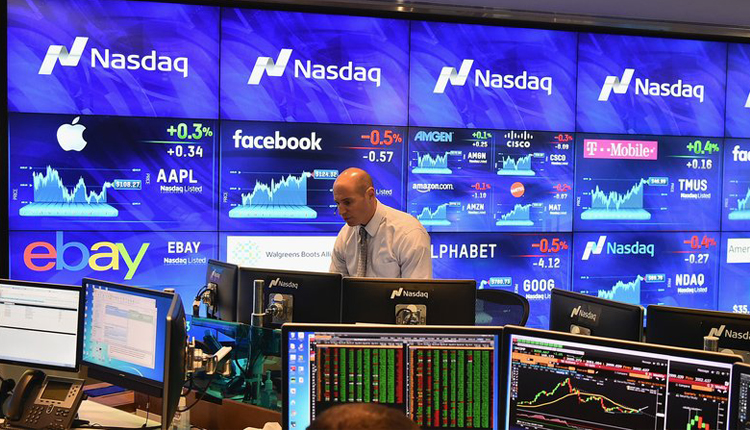US stocks rose on Monday, the first trading day of the third quarter, led by strong gains in tech. But lingering concerns about the Trump administration’s trade policies kept a lid on gains.
The Dow Jones Industrial Average closed 35.77 points higher after dropping nearly 200 points earlier in the session, with Microsoft rising 1.4 percent. The S&P 500 advanced 0.3 percent to 2,726.71 with tech rising 1 percent. The Nasdaq composite rose 0.8 percent to 7,567.69 as Facebook, Amazon and Netflix all traded higher.
The major indexes fell sharply earlier in the session as Wall Street grew even more worried about the spat between the U.S. and its key trade partners.
“Positive fundamentals are being offset, in the short term, by the fear of negative potential fall-out from the trade drama,” said Tom Essaye, founder of The Sevens Report.
“The actual tariffs in place (or about to be in place) don’t amount to much in global trade, and certainty won’t derail the U.S. economy,” Essaye said in a note. “But, the constant threats of something worse … is starting to have an effect because it’s going on too long, with no clear goal/end in sight.”
The Trump administration is reportedly looking into drafting a bill that would allow the White House to unilaterally increase trade tariffs without congressional consent, according to an Axios report published Sunday. If legislation moves ahead, it could mean that the U.S. would be acting outside of the World Trade Organization’s policies and rules.
Elsewhere, a report by the Financial Times suggested that the U.S. could receive a new round of tariffs worth as much as $300 billion, if Washington moves ahead with levies on automakers in the European Union.
Commerce Secretary Wilbur Ross doubled down on the administration’s trade efforts, stating on Monday that President Donald Trump will not change his mind even if the stock market falls sharply on trade worries.
“There’s no bright line level of the stock market that’s going to change policy,” Ross said on “Squawk Box.” “The president is trying to fix long-term problems that should have been fixed a long time ago.”
The U.S.’ increasing protectionist stance on trade has not only created uncertainty across global financial markets, but has also pushed other countries to issue retaliatory tariffs. Canada slapped charges on U.S. beef while China and Mexico took aim at U.S. pork imports.
“The big issue for the market is trade and tariffs right now,” said Kim Forrest, senior analyst at Fort Pitt Capital. “Will this impact your investments in the short term? Yes. Will it have an impact long term? I don’t think so.”
“I believe these are tactical tariffs,” Forrest said. “They are meant to bring people to some sort of bargaining table.”
Monday also marked the first trading day of the second half of the year. Equities posted mixed performances in the first half, with Nasdaq composite and S&P 500 rising 8.8 percent and 1.7 percent, respectively, while the Dow declined 1.8 percent. The small-caps Russell 2000, meanwhile, rose 7 percent to start off 2018.
Source: CNBC


